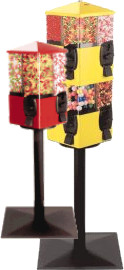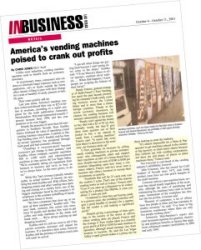|
Vending machines are our business!
Start browsing our catalog of candy machines, pop machines and
gumball machines. If you have any questions or would like to order
some vending machines, feel free to give us a call at |
Page
| By Category |
| Bulk Candy & Gumball Machines |
| FunTime Gumball Machines |
| Sipral gumball machine |
| Snack & Pop Machines |
| Medical Vending Machines |
| U-Spin Home | Why U-Spin? | News Articles | Specs/Warranty | FAQ | |||
 |
|
Frequently Asked Questions ? |
|||||
| The U-Spin Spacesavers - Simply The Best! | |||||||
|
America's
vending machines poised to crank out profits
Read article below |
|||||||
|
In recessionary times, consumers who cut down or eliminate larger expenses such as new appliances, cars or meals outside the home often remain willing to part with their change for a soda or handful of candy, peanuts or bubble gum. Their coins quickly add up. Last year alone, America's machine vendors nickel-and-dimed their way to $25.6 billion in revenues, according to a report prepared for the trade publication Automatic Merchandiser. That total represented a nearly 5 percent increase from 1999, and this year promises to be even bigger. Despite the presence of more than 60 competitors in Southern Nevada, Russ Kashka knows firsthand the value of operating a local vending machine concession. A partner in Sky Top Vending since 1977, Kashka said his family-owned operation has prospered through both good and bad economic climates. "(Vending) is recession-proof because everyone's got change in their pockets," said Kashka, whose company currently maintains 800 to 1,000 snack and entertainment machines at sites across the Las Vegas Valley. "We're constantly taking our equipment from business to business and we're as busy as we've always been. As the town grows, so do we." While Sky Top's revenue typically remains stable, its actual sources of income are anything but staid, Kashka said. With offices, bars, shopping centers and other vending sites opening and closing on a weekly basis, one of the biggest challenges faced by the company's 45 employees is the constant reshuffling of equipment from lessee to lessee. "We have companies that close up, so we pick up their equipment," Kashka said. "The next week, someone else comes into town, hires 50 people and decides they want to put coffee and soda machines in the snack and break room. ... We're always picking up and dropping locations." Kashka said it's still too soon to tell if the current economic downturn will impact his business. If a slowdown does come, however, Kashka said the presence of seldom-used coins will mark its arrival. "I can tell when things are getting hard because I start seeing silver coins in the drops," Kashka said. "I'll see Mercury dimes or silver quarters, wartime silver nickels. ... When that happens, I know people are scraping the bottom of their barrel." Randy Francis, general manager of Idaho-based vending manufacture (manufactures the U-Spin Spacesaver), has spent the past decade promoting his company's bulk candy vending business across the United States and in more than a dozen foreign countries. Thanks to the recent economic slowdown, he expects his vending business will increase substantially in the future. "People won't spend the money to buy their kid a $2 or $3 toy they normally would, but they'll give them some quarters out of their pocket to buy a toy capsule or candy from a vending machine," Francis said. "It seems like every time there's a downturn in the economy, our business picks up." The Idaho based vending company generates its revenues by selling candy vending machines to private entrepreneurs who subsequently place and support their machines as part of a home-based business. Despite start up costs of $300 to $500 per machine (depending upon how many customer orders), Francis said he's never seen a business that allows investors to recoup their investments so quickly. "Gumballs that sell for 25 cents only cost vendors 2 cents. That's one of the reasons vending works as well as it does," Francis said. "Even if you open up a dispenser to its widest setting for a product like M&Ms, it cost you about 11 cents per pull." "Compared to what they get buying candy in a grocery store, the (vending) customer still gets a good handful of product for a quarter, but the vendor is still making a significant profit." Despite giving a percentage of their earnings to the owners of the stores or offices the average U-Spin Spacesaver takes in a monthly gross profit of $50 to $100 for each machine in operation, although actual earnings vary from location to location. He said the Las Vegas Valley's rapid growth makes it a prime site for those looking to enter the industry. "It's almost impossible for a Mom & Pop operator to get machines placed in the casinos or big (grocery or retail store) chains because they contract out with vending corporations, but there are still plenty of places to place machines there," Francis said. Not everyone is convinced of the vending industry's infallibility, however. John Corcoran, who has owned Ice Cold Vendors of Nevada since 1973, said rising product costs have cut into profit margins at his small business. Corcoran said on a per-machine basis, revenue has stayed steady regardless of the economy, although the costs of purchasing and maintaining his machines have risen in recent years. Automation of the workplace has also cut into his profits, Corcoran said. "Because of computers, a lot of offices have less people in them and that translates to smaller accounts," he said. "I've been in big monstrous warehouses where there are only five people working there." Automatic Merchandiser's report also cited increased expenses for gasoline, electricity and employee benefits as factors that negatively influenced vendors' profitability in 2000 and early 2001.
-INBUSINESS Las Vegas - October 2001 - Article written by Chris Jones/IBLV Staff |
 Unlike most industries, vending machine operators tend to benefit
from an economic downturn.
Unlike most industries, vending machine operators tend to benefit
from an economic downturn.